Family Law in Pakistan: Guide to Family Lawyers in Pakistan
Family Lawyers in Resolving Legal Matters in Pakistan
Family lawyers in Pakistan are indispensable in managing legal concerns that revolve around family relationships. Family law, as a vital legal domain, addresses issues, including marriage, divorce, child custody, and inheritance. It serves as a guiding framework for resolving familial disputes, ensuring fairness and clarity for all parties involved. Family lawyers is essential in navigating the complexities of these matters, as they play a pivotal role in safeguarding the rights and responsibilities of family members. Whether it’s handling marital agreements, addressing child custody conflicts, or settling inheritance claims, family lawyers are integral to delivering equitable solutions within the bounds of Pakistan’s legal system.
Crucial Role of Family Lawyers in Pakistan’s Islamic Legal Framework
Family lawyers in Pakistan operate within a legal system deeply rooted in Islamic principles, which significantly shape the country’s family law regulations. This blend of religious and secular laws requires family lawyers to possess an in-depth understanding of both domains to provide effective legal representation the integration of Islamic principles in family law means that family lawyers must navigate complex legal interpretations while addressing issues that profoundly impact families, such as marriage, divorce, child custody, and inheritance.
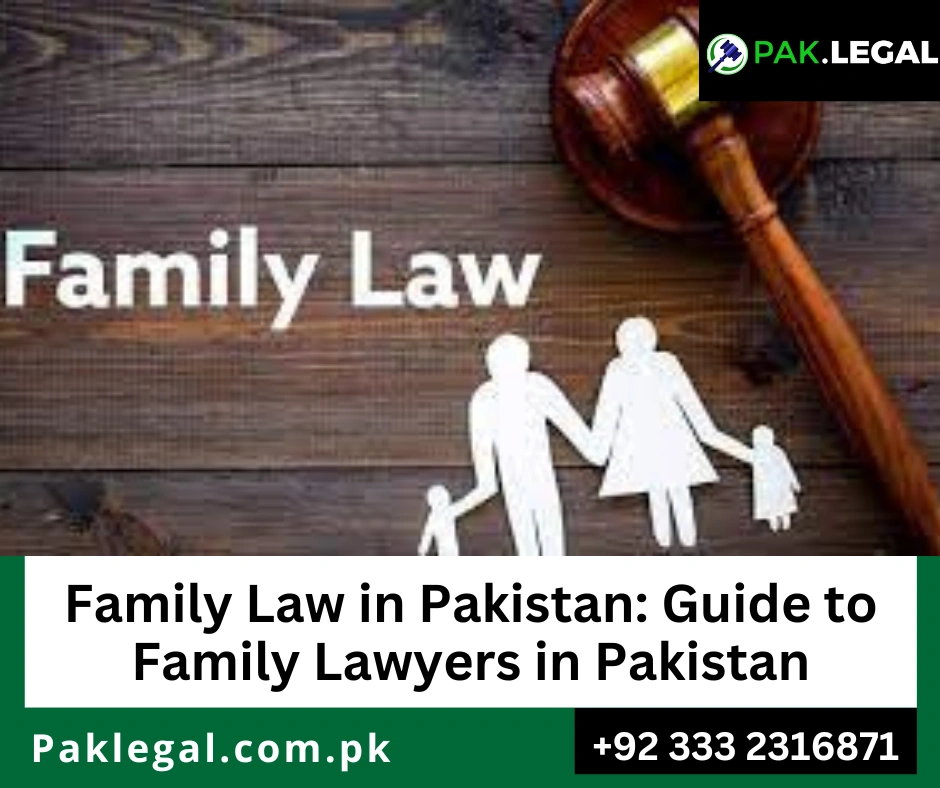

How Family Lawyers Navigate Complex Family Law Cases Across Pakistan
Family lawyers play an essential role in managing the complexities of family law cases, which often involve emotionally charged issues like child custody and divorce. Child custody disputes can have profound psychological impacts on both parents and children, making the expertise of family lawyers vital in achieving resolutions that prioritize the child’s best interests divorce cases are another area where family lawyers excel, as these proceedings frequently require meticulous negotiations and strategic legal approaches. In major Pakistani cities like Karachi, Lahore, Islamabad, Rawalpindi, Multan, and Faisalabad, family lawyers bring a deep understanding of the local legal framework, offering clients the critical support they need to navigate sensitive family law matters effectively.
Why Family Lawyers Are Essential for Resolving Family Law Disputes in Pakistan
Understanding family law in Pakistan is crucial for those navigating relationship disputes. Legal rights and responsibilities often differ based on specific circumstances, making the expertise of family lawyers indispensable. Family lawyers in Pakistan provide essential guidance, ensuring clients understand their legal standing and receive fair resolutions. Their specialized knowledge helps address sensitive family matters with professionalism, safeguarding the rights of all parties involved in these challenging situations.
Essential Role of Family Lawyers in Pakistan’s Major Cities
Family lawyers in Pakistan are pivotal, especially in cities like Karachi, Lahore, Islamabad, Rawalpindi, Multan, and Faisalabad. These legal experts specialize in family law, addressing crucial matters such as divorce, child custody, adoption, and family property disputes. Family lawyers provide indispensable guidance to clients, helping them navigate the complexities of family legal issues. By safeguarding their clients’ rights and interests, family lawyers ensure fair resolutions in often sensitive and challenging circumstances.
How Family Lawyers in Pakistan Provide Expert Legal Advice
A key responsibility of family lawyers in Pakistan is offering expert legal advice tailored to their clients’ unique circumstances. Family lawyers thoroughly analyze each case, guiding clients on the legal implications of their decisions and outlining the possible outcomes of various legal options. This professional advice is crucial in helping clients make well-informed choices that align with their personal needs and objectives. By leveraging their expertise, family lawyers empower individuals to navigate complex family legal matters effectively.
The Critical Role of Family Lawyers in Court Representation
Family lawyers in Pakistan play a pivotal role in representing clients during court proceedings. They handle essential tasks such as preparing legal documents, presenting evidence, and arguing cases during hearings and trials. This representation is especially crucial in high-stakes, emotionally charged situations like divorce or custody disputes. Family lawyers ensure their clients’ arguments are effectively communicated, advocating for favorable outcomes while navigating the complexities of the legal system with expertise and dedication.
Regions Covered: Karachi, Lahore, Islamabad, Rawalpindi, Multan, and Faisalabad
Pakistan, a country rich in cultural diversity, exhibits substantial regional variations in the practice of family law. Each major city possesses unique characteristics that influence local customs, court systems, and legal environments, necessitating specialized legal expertise that is often provided by family lawyers. Karachi, the largest city and economic hub, has a dynamic legal landscape. Family lawyers in Karachi encounter a bustling court environment where cases may be expedited due to the dense population. The city’s multicultural nature may also lead to a blend of practices concerning family law.
The Expertise of Family Lawyers in Lahore’s Unique Legal Landscape
Lahore, rich in historical heritage, offers a traditional approach to family law. Family lawyers in Lahore excel in addressing the unique blend of local customs and legal norms that significantly influence family disputes. Navigating the city’s court system requires an understanding of both The Expertise of Family Lawyers in Lahore’s Unique Legal Landscape
Family Lawyers in Islamabad’s Federal Legal Framework
In Islamabad, family law practice often reflects the city’s formalized governmental structures and federal oversight. Family lawyers in Islamabad frequently handle cases influenced by federal legislation, making their expertise vital for navigating this unique legal environment. Their role is critical in helping clients understand their rights and obligations within this framework, ensuring effective representation and informed decision-making. Family lawyers in Islamabad bridge the gap between complex federal laws and the personal legal needs of their clients.
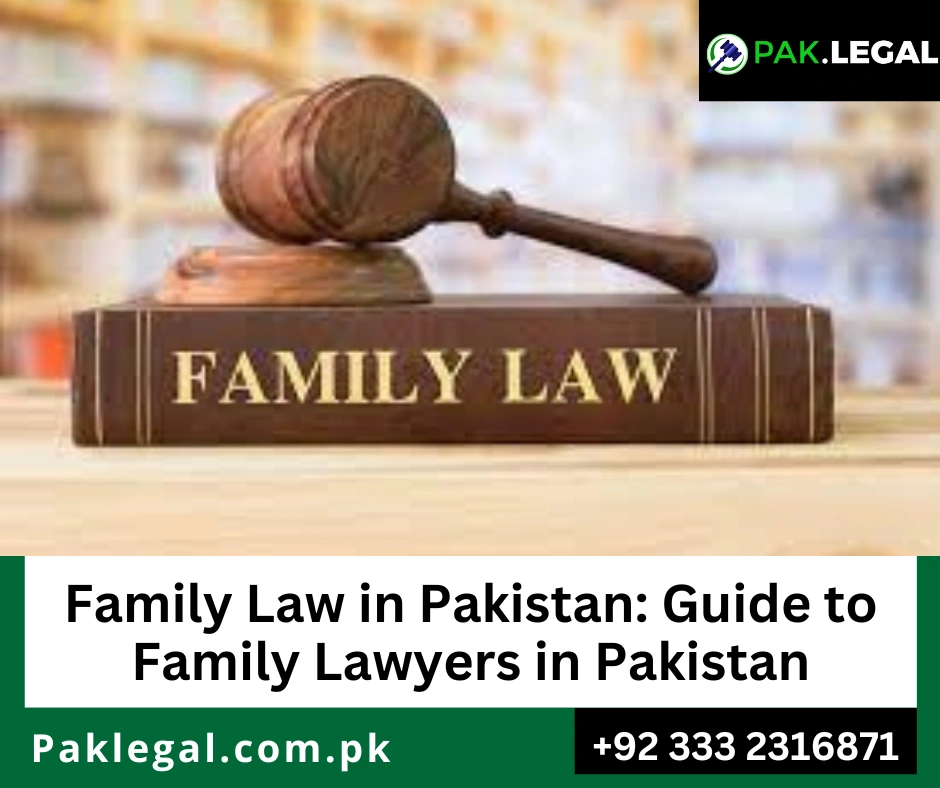
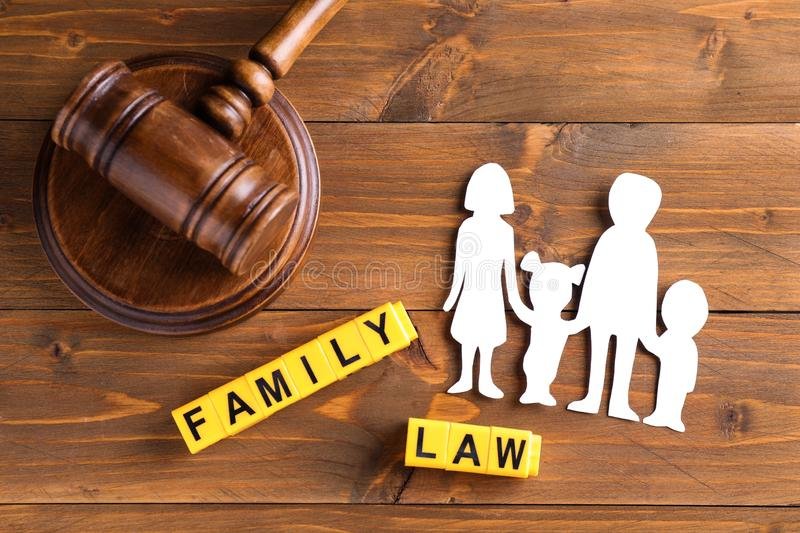
Adapting to Diverse Legal Dynamics: Family Lawyers in Rawalpindi and Multan
Family lawyers in Rawalpindi navigate a unique blend of urban and rural influences, addressing disputes that combine modern legal expectations with traditional family structures. This duality demands adaptability and a deep understanding of both perspectives in Multan, family lawyers operate within a legal landscape shaped heavily by local customs. Sensitivity to cultural norms is essential, as these traditions can significantly impact family law cases. In both cities, family lawyers provide tailored guidance to meet diverse client needs.
Role of Family Lawyers in Faisalabad: Balancing Legal and Socioeconomic Factors
Faisalabad, known for its industrial prominence, offers a distinct environment where family law practices intersect with socioeconomic influences. Family lawyers in Faisalabad must navigate a legal landscape shaped by the diverse backgrounds and family dynamics of their clients. The city’s industrial base adds complexity to legal matters, requiring family lawyers to consider both economic factors and cultural nuances when handling cases. These regional differences highlight the importance of local expertise for effective family law representation across Pakistan.
Key Family Law Issues in Pakistan and the Role of Family Lawyers
Family law in Pakistan addresses a broad spectrum of legal matters essential for protecting the welfare of individuals and families. One of the primary issues is marital disputes, which often stem from factors like personality differences, financial stress, and communication breakdowns. In such cases, family lawyers in Karachi, Lahore, Islamabad, Rawalpindi, Multan, and Faisalabad play a vital role in mediating or representing clients throughout the legal process, ensuring that their rights and interests are effectively protected.
Child Custody and the Crucial Role of Family Lawyers in Pakistan
Child custody disputes, especially in the aftermath of divorce, are another significant issue in family law in Pakistan. These custody battles can be emotionally challenging for all parties involved. Courts in Pakistan prioritize the best interests of the child when determining custodial rights, making a thorough understanding of family law essential. Family lawyers in Pakistan are crucial in guiding and representing clients through these complex, emotionally charged proceedings, ensuring that their client’s rights and the child’s welfare are effectively protected.
Dowry Disputes and the Essential Role of Family Lawyers in Pakistan
Dowry-related issues are a significant aspect of family law in Pakistan, often leading to legal conflicts, especially when harassment or abuse is involved. While dowry laws are designed to protect individuals, particularly women, from exploitation, navigating these complex legal frameworks requires professional expertise. Family lawyers in Islamabad and other major cities play a crucial role in helping clients understand their rights and responsibilities concerning dowry agreements, ensuring that their legal interests are safeguarded and that any disputes are resolved efficiently.
Property Settlements and the Role of Family Lawyers in Divorce Proceedings
Property settlements frequently arise during divorce proceedings, as dividing assets can lead to contentious disputes. Ensuring a fair distribution of marital property requires not only a thorough understanding of legal frameworks but also strong negotiation skills. Engaging qualified family lawyers in Rawalpindi, Lahore, or other cities helps clients secure equitable settlements, minimizing the likelihood of further disputes after the divorce and ensuring that both parties’ rights are properly upheld throughout the process.
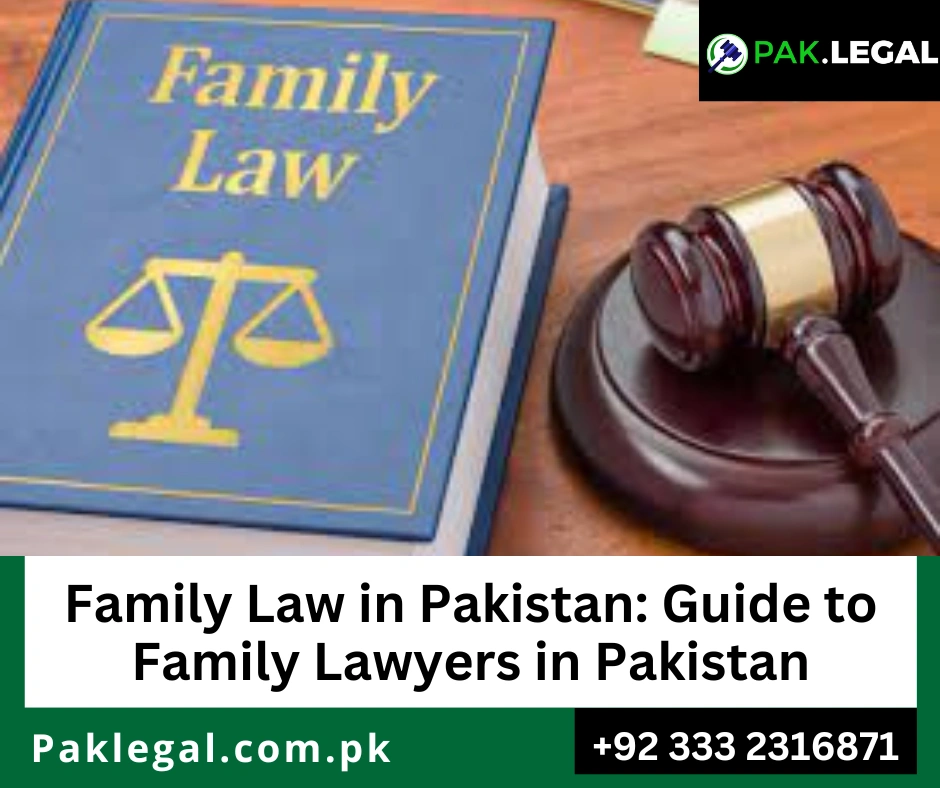
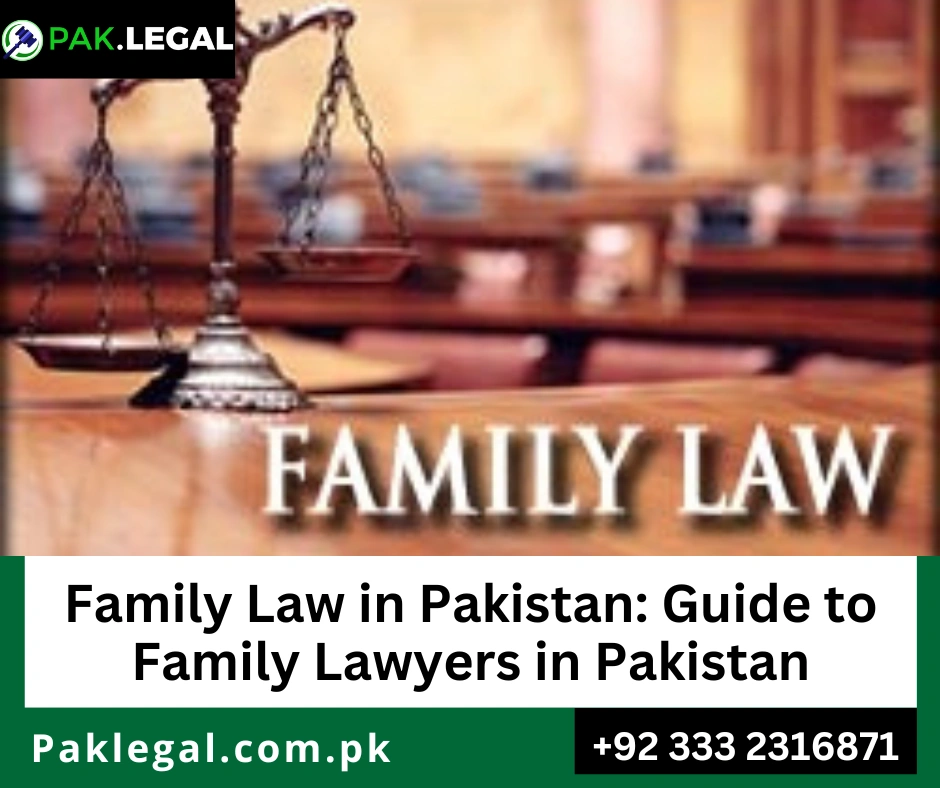
How to Choose the Right Family Lawyer
Choosing the right family lawyer is a critical decision that can significantly impact the outcome of your legal matters. When seeking family lawyers in Pakistan, several key criteria should be considered to ensure that you are selecting a qualified professional suited to your particular needs.
Importance of Experience When Choosing Family Lawyers in Pakistan
Experience is a crucial factor when selecting a family lawyer. It’s essential to choose a lawyer with substantial experience in handling cases similar to yours. Whether dealing with divorce, child custody, or property disputes, family lawyers in Karachi, Lahore, Islamabad, Rawalpindi, Multan, and Faisalabad often specialize in specific areas of family law. Evaluating a lawyer’s track record can offer valuable insights into their ability to navigate complex family law issues and provide effective representation for your case.
Importance of Specialization in Family Law When Choosing a Lawyer
Specialization in family law is another crucial factor when selecting a lawyer. Family law covers a wide range of issues, including marriage, divorce, child custody, and adoption, each requiring a distinct set of skills and knowledge. Choosing a lawyer who specializes specifically in family law, rather than a general practitioner, ensures they are up-to-date with the latest developments and nuances of family law in Pakistan, providing you with the expertise needed for a successful resolution of your case.
Importance of Communication Skills in Family Lawyers
Effective communication is essential when choosing a family lawyer. A skilled family lawyer should be able to clearly and concisely explain complex legal concepts, ensuring that clients understand their options and can make informed decisions. Additionally, reading past client reviews can offer valuable insights into how a lawyer interacts with clients and whether they maintain strong communication throughout the legal process, fostering trust and transparency. A lawyer with excellent communication skills can significantly enhance your experience and ensure better outcomes.
Personal Rapport with Family Lawyers for Successful Case Outcomes
Establishing a strong personal rapport with your family lawyer is essential. A trusting relationship with your family lawyer can significantly reduce the emotional stress often involved in family law matters. This rapport encourages open communication about sensitive issues. It is vital to meet with potential family lawyers to assess their compatibility with your needs, ensuring you select a family lawyer you feel comfortable working with. A strong relationship can help navigate difficult family law cases more effectively.
Legal Fees and Costs Involved
Navigating family law matters often necessitates the expertise of qualified family lawyers in Pakistan. Understanding the legal fees and associated costs is essential for clients seeking representation in cities like Karachi, Lahore, Islamabad, Rawalpindi, Multan, and Faisalabad. Legal fee structures vary significantly and typically include hourly rates, flat fees, and retainer agreements.
Hourly Rates of Family Lawyers in Karachi: What to Expect
Hourly rates are standard for family lawyers in Karachi and other major cities, ranging from PKR 5,000 to PKR 15,000 per hour, based on the lawyer’s experience and expertise. These rates can result in significant costs, especially as the complexity and duration of family law cases may exceed initial estimates. To manage expenses effectively, clients are advised to discuss the anticipated number of hours required for their case, ensuring they can budget accordingly.
Flat Fees for Family Lawyers in Islamabad: A Clear Cost Structure
Some family lawyers in Islamabad and other cities may offer flat fees for certain services. For example, uncontested divorce proceedings could have a set fee ranging from PKR 20,000 to PKR 60,000. Flat fees offer clients clarity on costs from the outset, making them an attractive option, particularly for straightforward cases. Clients should confirm what the flat fee covers to ensure there are no unexpected charges during the process.
Retainer Agreements for Family Lawyers in Rawalpindi and Multan: Key Considerations
Retainer agreements are commonly used by family lawyers in Rawalpindi and Multan, especially for more complex, time-consuming cases. Clients pay an upfront fee to secure ongoing legal representation. This structure ensures continuous legal support but requires clarity on how the retainer fee is applied to hourly charges. Clients should also inquire whether any unused fees are refundable to avoid unexpected costs. Understanding these details helps clients manage their legal expenses effectively.
Additional Costs in Family Law Cases: What Clients Need to Know
Beyond the primary payment structures, clients should be aware of additional expenses, including court fees, administrative charges, and third-party services such as mediators or child custody evaluators. These costs can add up, so it’s essential to maintain open communication with your family lawyer regarding financial expectations. By discussing these potential expenses upfront, clients can ensure a smoother, more predictable legal process without unexpected financial surprises.
Common Misconceptions About Family Law
Family law in Pakistan is often clouded by various misconceptions that can lead to confusion and misinformation. One prevalent myth is that the outcome of family law cases is heavily influenced by the personal biases of judges. While it is true that judges are human and may have individual beliefs, the legal framework in Pakistan strives to ensure justice through established laws and procedures. Renowned family lawyers in Karachi, Lahore, Islamabad, Rawalpindi, Multan, and Faisalabad emphasize the importance of basing decisions on facts and evidence rather than personal prejudices.
Debunking the Myth of Complicated Divorce Proceedings in Pakistan
A common misconception about divorce in Pakistan is that it is always a lengthy and complicated process. Many fear that initiating a divorce will lead to prolonged legal battles and hefty financial costs. However, while the complexity of divorce can vary, family lawyers in Pakistan often help streamline the process. By providing expert guidance and handling essential paperwork, they can significantly reduce the stress and duration of divorce proceedings, ensuring a more efficient experience for clients.


Understanding Custody Arrangements in Pakistan: Myths and Realities
Custody arrangements for children are often misunderstood, with the common belief that mothers automatically receive custody after a divorce. In reality, custody decisions are based on the child’s best interests, considering factors such as age, needs, and the ability of each parent to provide a stable environment. Family lawyers in Islamabad and other cities are skilled at addressing these sensitive matters, advocating for fair custody solutions that prioritize the child’s well-being and ensure an equitable outcome for both parents.
Clarifying the Costs of Hiring Family Lawyers in Rawalpindi and Beyond
Misconceptions about the costs of hiring family lawyers in Rawalpindi and other cities are common. It’s crucial for individuals to understand that fees can vary significantly depending on the complexity of the case and the services needed. Consulting with a family law expert can provide clarity on the expected costs, helping clients make informed decisions and avoid unexpected financial surprises during the legal process.
Case Studies: Success Stories from Family Lawyers
In the realm of family law in Pakistan, numerous case studies exemplify the effectiveness of skilled family lawyers in addressing and resolving complex family matters. The experience of each client varies, but successful outcomes often hinge on the expertise and dedication of their legal representation. One notable case involves a couple in Lahore facing divorce proceedings. The husband was contesting the custody of their two children. With expert guidance from family lawyers in Lahore, the legal team conducted a thorough investigation into the welfare of the children, gathering crucial evidence that ultimately supported the husband’s case for custody. This situation demonstrates how the insights and strategies employed by family lawyers can significantly impact the outcome for families in distress.
A Success Story: The Role of Family Lawyers in Securing Financial Support in Karachi
In a family law case in Karachi, a wife sought financial support after a difficult separation. The family lawyers in Karachi carefully prepared her case, ensuring transparency in presenting financial documents. The negotiation process highlighted the economic impacts of the divorce, and through skilled advocacy, the wife secured a fair settlement. This enabled her to regain stability and support her children. This story underscores the value of experienced family lawyers in Pakistan, who navigate both legal and emotional complexities to achieve positive outcomes.
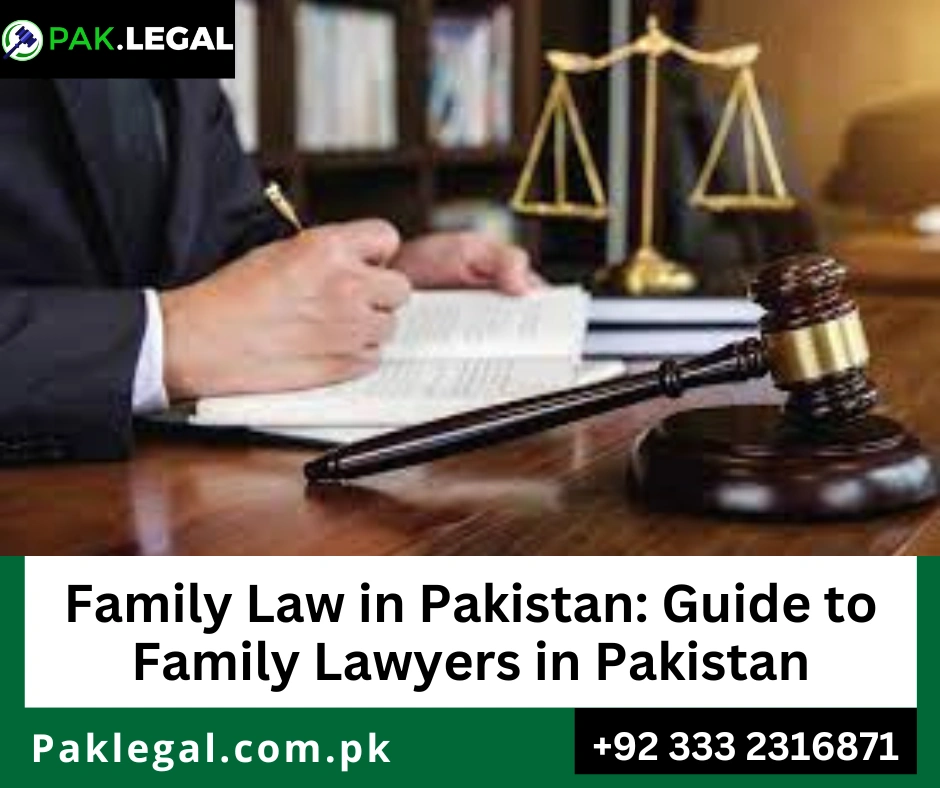

Navigating Property Disputes in Divorce: A Success Story from Islamabad
In a complex property dispute following a divorce in Islamabad, family lawyers played a crucial role in mediating between both parties. Through effective negotiation, they facilitated an amicable agreement that ensured the fair distribution of assets. This not only alleviated the legal burden on the couple but also fostered a cooperative relationship, benefiting their children. These success stories highlight the essential role family lawyers play in managing intricate family matters, offering invaluable support to clients in cities like Rawalpindi, Multan, Faisalabad, and beyond.
The Importance of Experienced Family Lawyers in Pakistan’s Legal Landscape
Family law in Pakistan requires careful attention and expertise due to its significant impact on individuals and families. Throughout this guide, we have emphasized the value of seeking experienced family lawyers in key cities such as Karachi, Lahore, Islamabad, Rawalpindi, Multan, and Faisalabad. Hiring qualified legal professionals can greatly ease the complexities of managing family disputes, divorce proceedings, custody battles, and property matters, ensuring a smoother and more informed legal process for those involved.
Family Lawyers in Navigating Pakistan’s Legal Complexities
Navigating family law in Pakistan requires recognizing the vital role that skilled family lawyers play. These professionals possess a comprehensive understanding of legal frameworks, local regulations, and the emotional complexities inherent in family matters. Across major cities like Karachi and Lahore, experienced family lawyers offer tailored advice and strong representation, ensuring clients receive expert guidance in addressing diverse legal challenges. Whether dealing with divorce, custody, or property disputes, individuals can find competent legal support to navigate these issues effectively.
Early Legal Intervention in Family Law Matters
The significance of early legal intervention in family law cannot be overstated. Proactively consulting with family lawyers in Pakistan allows individuals to understand their rights and obligations, empowering them to make informed decisions that can prevent future conflicts. Legal professionals also play a crucial role in drafting essential agreements, ensuring clients are fully protected in all aspects of family law. By seeking timely legal advice, individuals can better navigate the complexities of family matters with confidence and clarity.
